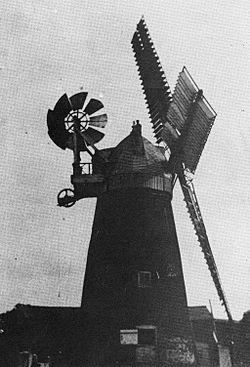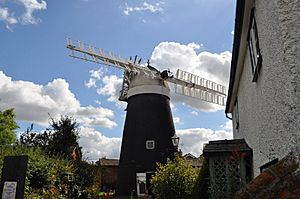Bardwell Windmill facts for kids
Quick facts for kids Bardwell Windmill |
|
|---|---|

The mill in 1910
|
|
| Origin | |
| Mill name | Bardwell Mill |
| Mill location | TL 941 738 |
| Coordinates | 52°19′40″N 0°50′58″E / 52.32778°N 0.84944°E |
| Operator(s) | Private |
| Year built | 1823 |
| Information | |
| Purpose | Corn mill |
| Type | Tower mill |
| Storeys | Four storeys |
| No. of sails | Four Sails |
| Type of sails | Patent sails |
| Winding | Fantail |
| Fantail blades | Eight blades |
| No. of pairs of millstones | Two pairs |
Bardwell Mill is a special old windmill in Bardwell, Suffolk, England. It is a 'tower mill,' which means it is built like a tall, round tower. This mill is currently being fixed up so it can look its best again. It is a Grade II* listed building, meaning it is an important historical site.
Contents
History of Bardwell Mill
Building and Early Use
Bardwell Mill was built a long time ago, in 1823. For over 100 years, it used the power of the wind to grind corn. This was how people made flour for bread and other foods. In 1925, the mill stopped using wind power. Instead, it started working with a special oil engine made by a company called Blackstone. It kept grinding corn with this engine until 1941.
Restoration and Challenges
By 1978, the mill was in bad shape and not being used. It was bought by James Waterfield, who worked hard to fix it up. He finished the first restoration in 1985. The mill was then sold to Geoffrey and Enid Wheeler in 1987.
However, a big problem happened soon after. On October 16, 1987, a very strong storm hit. The mill was damaged when a part of its fantail system broke. The fantail helps the mill turn to face the wind. Because it broke, the main shaft holding the sails snapped. This caused the huge sails to crash to the ground.
Rebuilding Efforts and Community Help
Work to fix the mill started again in 1989. But it was difficult because there was not enough money. Geoffrey Wheeler, one of the owners, passed away in 1995. In 1997, a group called The Friends of Bardwell Windmill was created. This group wanted to help raise money and support the mill's restoration.
They received a lot of help from English Heritage and St Edmundsbury Borough Council. These organizations gave over £73,000 towards the repairs. The total cost was about £92,000, so the Friends group worked to raise the rest. In 2004, new parts were put on the mill. These included a new cap (the top part), a strong cast-iron windshaft (the main axle), and a new fantail.
New Sails and Completion
Because costs were still high, it was decided that volunteers would build the new sails. This saved a lot of money. The first two sails were finished by late summer 2008. They were put onto the mill in late 2010. The final two sails were added in April 2012. This meant the mill once again had all its sails.
How Bardwell Mill Works
Bardwell Mill is a four-storey tower mill. This means it has four levels inside its tall, round structure. The top part of the mill is called the beehive cap. This cap can turn to face the wind, and it is moved by a special part called a fantail. The fantail has eight blades, like a small propeller.
When the four large sails are attached, they stretch out about 63 feet (19 m). These are called Patent sails, which means they can be adjusted automatically. The sails are connected to a strong cast-iron windshaft. This windshaft was made in 1989, replacing the original one.
Inside the mill, the windshaft turns a large wooden gear called the brake wheel. This wheel then turns another gear, the wallower, which is made of cast-iron. The wallower sits on a long wooden pole called the upright shaft.
A big wooden gear, the great spur wheel, is also on the upright shaft. This wheel turns two pairs of overdrift millstones. These are the heavy stones that grind the corn into flour. There is also a wooden crownwheel on the upright shaft. This wheel helps power a sack hoist, which lifts heavy sacks of grain up to the different levels of the mill.
Millers of Bardwell Mill
- James Waterfield (1985–1987)
- Simon Wooster (1987)
- Geoffrey Wheeler (1987–1995)
Visiting Bardwell Mill
The mill is open for people to visit "at any reasonable time." This means you can usually go and see it during daylight hours. It is a great place to learn about how windmills used to work and see a piece of history.
 | DeHart Hubbard |
 | Wilma Rudolph |
 | Jesse Owens |
 | Jackie Joyner-Kersee |
 | Major Taylor |


